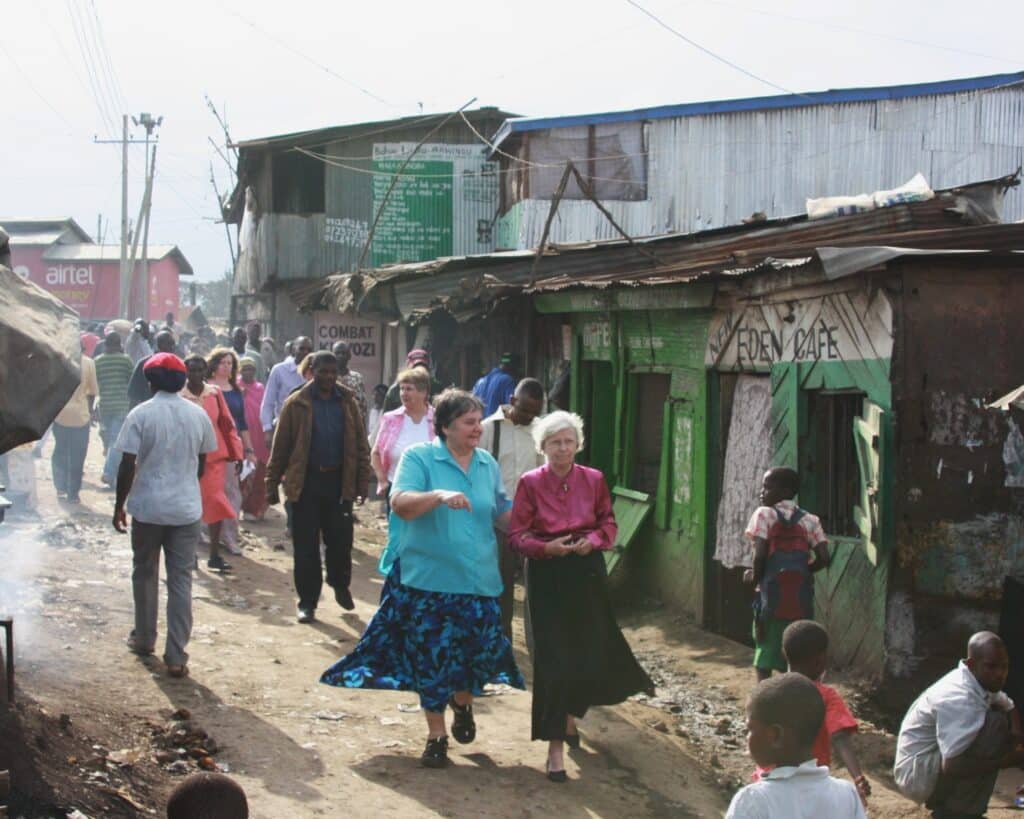It all started with a “No” from one of the programs Microfinancing Partners in Africa now partners with. But leave it to Microfinancing Partners in Africa founder, Sr. Toni Temporiti, not to let that stop her vision.
As a child, Temporiti was exposed firsthand to the power of microfinance. Thanks to a small business loan, her grandmother was able to start and own a small grocery shop in the Italian district of St. Louis, MO commonly called “The Hill.
Fast forward years later, and after one sabbatical from Cairo to Cape Town, and Temporiti was back at it, ready to put the possibility of microfinance in African communities into action.
Meet Ingrid Monroe
Sr. Toni Temporiti attended a regional microcredit summit in Nova Scotia, and met a speaker representing a microfinancing institution in Kenya, Ingrid Munro. Temporiti asked Ingrid to be partners, and Ingrid said, “No.” This was unexpected, and Sister Toni inquired why. Munro explained, “You are a sister, and the desire to be charitable is a powerful force. If a mother comes to you and asks for $10 to pay for medical care for her child or else the child will die, what would you do?” Temporiti answered honestly, “I would give her the $10.” “And,” continued Ingrid, “if that same mother had not repaid you but came back in a month asking for another $10 for more medical bills for another child or else that child would also die, what would you do?” Sister Toni answered, “I would give her the $10.” Ingrid answered, “And that is why we cannot partner with you. I understand why you would do that, but it would destroy everything we have worked to achieve. By insisting on repaying loans, only in this way can we restore the dignity of those living in extreme poverty.”
Temporiti thought about that for a moment and said, “I understand. But will you let me visit you in Nairobi?” And to that, Ingrid Munro said, “Yes.” Temporiti met Munro again in Kenya in 2007 and together they established the way in which Microfinancing Partners in Africa could partner with Jamii Bora.
Today, Microfinancing Partners in Africa partners with Jamii Bora, meaning ‘good families’, which was established in 1999 starting with 50 street beggars in Nairobi, Kenya as the original members. Currently the microfinancing function now is organized within Yawezekana (“It is possible”) SACCO. Members form small groups and vouch for each other and train together on managing an income project. A typical first loan might be $10-15 USD. Loans are small with an average loan size of KES 7,209 (USD $92). Members must open saving accounts first and can then borrow twice as much as they have saved after a minimum of 6 weeks. A variety of loans are offered to members – loans for microenterprises, school fees, health and housing. Technology is increasingly playing an important part in the expansion of Jamii Bora with POS (point of sale) machines being used to register new members and track each transaction thereafter.
Jamii Bora Trust manages several support functions to encourage successful repayments of the microloans extended through Yawezekana SACCO. They offer health insurance for a member’s entire family, life insurance which in the case of death forgives any outstanding loan, and pays twice the savings balance to the member’s children, the Tumaini social workers who support street beggars joining the Jamii Bora/Yawezekana family, and the Levuka Centre, which offers an inpatient sobriety program for members or anyone in their family. These supports all have in common the goal to help with the success of income projects.

Jamii Bora also offers microfinance add-on services such as health insurance and housing. The 2009 State of the Microcredit Summit Campaign Report highlighted the work of Jamii Bora and its unique health insurance and housing initiative for the poor. The health insurance program was developed in response to the finding that 93 percent of members that defaulted did so because a family member was sick and in hospital.
Microfinancing the Microfinancing Partners in Africa Way
Each of our projects throughout East Africa at the core are grassroots microfinancing organizations offer training, support, and a reliable method of saving, borrowing, and growing a business. Through strategic steps with each microfinance project individuals and communities come together to develop and advance business opportunities centered around microfinancing to help lift themselves out of extreme poverty.
Microfinancing looks different for each of our projects – while some are animal based and the loan is structured around the repayment with a “living loan”, others are structured around a community of individuals working together to create products for sale. At the center of each of our projects is one thing: the opportunity for a hand up from poverty to possibility
Additional Sources:

